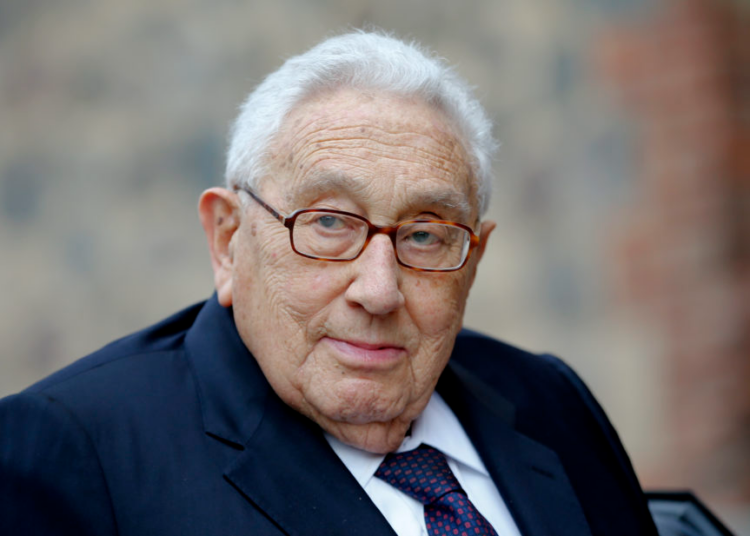The apostle of Realpolitik, a pragmatic approach to politics, Dr Henry Alfred Kissinger, has transcended to eternity at a ripe age of 100 years. As National Security Adviser and later Secretary of State in the Richard Nixon and Gerald Ford administrations, he dominated the foreign policy scene of the United States of America (USA) for years and played key roles in directing world affairs.
Kissinger was as controversial as he was respected for his immense intellectual presence which he deployed in the service of humanity as an academic, politician and diplomat. While historians and friends extol his diplomatic achievements, critics assail his foreign policy actions.
It must, however, be acknowledged that he functioned at a time of deep division and strife in the United States over the Vietnam war even as his long career inspired decades of debate on the morality of his actions.
The Nixon daughters reacting to his death, said that he was one of America’s skilled diplomats who “worked with our father in a partnership that produced a generation of peace for our nation.”
Till his death, his voice was respected and his expertise sought after in efforts aimed at resolving knotty issues that impinge on international relations using the instrumentality of his Kissinger Associates, an international geopolitical consulting firm. To analysts, he was a go-to adviser for many American Presidents over his decades in politics.
Born in Germany of Jewish ancestry, he fled Nazi Germany in 1938 and served in the army of the United States of America. It is to the credit of this Harvard brought up that a policy of détente became a viable tool that eased strained relations and led to arms control treaties between the United States and the then Union of Soviet Socialist Republics (USSR).
This foreign policy strategist of considerable clout has the misfortune of being perceived as leaving behind a complicated legacy which still resonates in America’s relations with China, Southeast Asia and the Middle East.
With the doctrine of rapprochement, he orchestrated the opening of relations between the United States and the Peoples Republic of China. Similarly, Kissinger adopted what was later known as shuttle diplomacy in the crisis-ridden Middle East that helped bring an end to the Yom Kippur war in 1973 and negotiated the Paris Peace Accord which ended American involvement in the Vietnam War. In 1973, he shared Nobel Peace Prize for his involvement in talks that ended that war. That honour to him generated the kind of controversy befitting of a man of his complex stature.
Hailed for his brilliance and statesmanship, Kissinger was also criticized for his support for anti-communist dictatorships. He remained unapologetic on his stand and for good reasons.
In the view of this newspaper, his anti-communist proclivities are to be expected at a time in world affairs when capitalism championed by the United States was at war with communist-socialist ideas of the Leninist-Marxist hue as was propagated by the then USSR.
Reacting to his death, President of the United States, Joe Biden recalled, “I was a young Senator and he was Secretary of State giving briefing on the state of the world.”
Biden went on to add that “throughout our careers, we often disagreed. And often strongly. But from the first briefing, his fierce intellect and profound strategic focus was evident. Long after retiring from government, he continued to offer his views and ideas to the most important policy discussions across multiple generations.”
The current United States Secretary of State, Antony Blinken, has very fond memories of his predecessor in office. In Blinken’s words, “to serve as America’s chief diplomat today is to move through a world that bears Henry’s lasting imprint- relationships he forged, to the tools he pioneered, to the architecture he built.”
Chinese Foreign Relations Ministry, reacting to the death of Kissinger, praised his historic contributions to Sino-American ties and described him as an old and good friend of the Chinese people.
On his part, Russian President, Vladimir Putin praised Kissinger for his contributions to US-Soviet relations and described him as a wise and visionary statesman.
“Henry Kissinger’s name is inextricably linked with his pragmatic foreign policy which in its time paved the way for détente in international tensions and made it possible to reach the most important Soviet- American agreements that contributed to strengthening global security” Putin said.
The United Nations’ Secretary General, Antonio Guterres, in his reaction referred to Kissinger as a prominent figure in international relations during the late 20th century and added that “few diplomats in living memory have had a greater influence on international affairs than Kissinger”.
French President, Emmanuel Macron described Kissinger as a giant of History whose century of ideas and diplomacy had a long standing influence on his time and on our world.
May his soul rest in peace.





